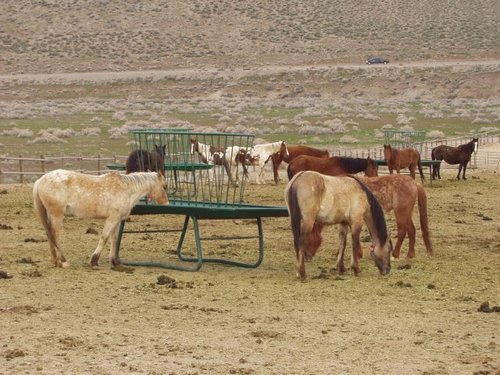The U.S. Department of Agriculture's Wildlife Services' (WS) National Wildlife Research Center (NWRC) has announced that the U.S. Environmental Protection Agency (EPA) has granted regulatory approval for the use of GonaConTM - Equine immunocontraceptive vaccine (GonaCon) in adult female wild or feral horses and burros.

BLM feeding station for wild horses
GonaCon which was developed by NWRC scientists and is the first single-shot, multiyear wildlife contraceptive for use in mammals has been approved by the EPA for use in wild horses and burros.
© 2013 by Peter Schmalzer
GonaCon was developed by NWRC scientists and is the first single-shot, multiyear wildlife contraceptive for use in mammals.
“Since 2009, GonaCon has been available for use in female white-tailed deer. We are pleased to be able to expand the vaccine's application to include wild horses and burros,” said NWRC Director Larry Clark. “This nonlethal tool will provide another option to wildlife managers working to reduce overabundant wild horse and burro populations in the United States.”
Overpopulation of wild horses and burros is a significant concern in the United States, as these animals can overgraze native plant species and compete with livestock and local wildlife for food and habitat. The Bureau of Land Management (BLM) estimates that approximately 37,300 wild horses and burros (about 31,500 horses and 5,800 burros) are roaming on BLM-managed rangelands in 10 Western states.
The estimated current free-roaming population exceeds by nearly 11,000 the number that the BLM has determined can exist in balance with other public rangeland resources and uses. Current management options are limited with the majority of actions involving the removal of horses and burros from the range and either offering them for adoption or holding them indefinitely in captivity.
The BLM estimates there are more than 49,000 wild horses and burros off of BLM-managed lands that are fed and cared for at short-term corrals and long-term pastures.
The GonaCon-Equine vaccine stimulates the production of antibodies that bind to the gonadotropin-releasing hormone (GnRH) in an animal's body. GnRH signals the production of sex hormones (e.g., estrogen, progesterone and testosterone). By binding to GnRH, the antibodies reduce GnRH’s ability to stimulate the release of these sex hormones.
All sexual activity is decreased, and animals remain in a nonreproductive state as long as a sufficient level of antibody activity is present. The product can be delivered by hand injection, jab stick, or darting.
